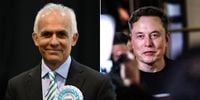In a dramatic turn for British politics, tech billionaire Elon Musk has reignited his public feud with Reform UK leader Nigel Farage, dismissing Farage’s hardline immigration plans as insufficient and throwing his support behind a rival upstart party. The clash, which unfolded over social media and in the press on August 26 and 27, 2025, has sent ripples through the UK’s political landscape, just as immigration issues surge to the forefront of the national debate.
Farage, never one to shy from controversy, unveiled his party’s “Operation Restoring Justice” platform on August 26, 2025, promising a sweeping overhaul of the UK’s immigration system. The plan’s headline pledge? Deporting 600,000 illegal immigrants within five years if Reform UK wins the next election. To achieve this, Farage vowed to repeal the Tony Blair-era Human Rights Act and withdraw Britain from the European Convention on Human Rights—two legal frameworks frequently used to block deportations, according to The Guardian and BBC.
“We will form a UK Deportation Command to remove all illegal aliens from the country, including those to Afghanistan,” Farage declared, outlining the party’s intent to pass an “Illegal Migration Mass Deportation Act” that would strip the left-leaning judiciary of powers to halt deportations. The plan also includes building mass detention centres—capable of holding up to 24,000 people—at disused RAF bases, and pursuing deals with countries such as Afghanistan, Iran, and even El Salvador to house asylum seekers. In a surprising twist, Taliban officials have reportedly expressed readiness to work with Farage, though they prefer aid over direct payment for deportation agreements, as reported by HuffPost UK.
Farage’s proposals drew immediate fire from Labour politicians and legacy media outlets, who branded the measures too radical. Yet the most headline-grabbing criticism came from none other than Elon Musk, who took to his X platform to lambast Farage’s efforts. “Unfortunately, the reality is that Farage will do almost nothing to protect Britain. That is obvious,” Musk posted on August 26, 2025. In a more scathing follow-up, he wrote, “Farage is weak sauce who will do nothing.” Musk’s comments quickly trended, sparking debate among political observers and the public alike.
But Musk didn’t stop at criticism. In a move that could shake up the upcoming election, he publicly endorsed Advance UK, a new party founded just two months ago by Ben Habib, the Pakistani-born former Reform chairman. According to GB News, Musk and Habib had been in contact since January 2025, laying the groundwork for this high-profile endorsement. “Advance UK will actually drive change,” Musk wrote, signaling a dramatic shift from his previous, if uneasy, alliance with Farage.
Advance UK, while still a fledgling force, could pose a significant threat to Reform UK’s standing, especially if Musk’s considerable financial and social media influence comes into play. With Reform leading in national polls at 28 percent—compared to Labour’s 20 percent and the Conservatives’ 17 percent, according to Sky News and YouGov—any division of the right-wing vote could have major consequences. Immigration, now the third biggest priority for Scots at 21 percent (up from just 4 percent in May 2023, as reported by The Standard), has become a defining issue across Britain, making the stakes even higher.
The rift between Musk and Farage is not new. Their relationship began to unravel in January 2025, when Musk called for Farage to be replaced as Reform leader over his opposition to veteran anti-grooming activist Tommy Robinson joining the party. This public spat followed Musk’s sudden interest in the issue of grooming gangs in Britain—a topic Farage and his allies have raised for over a decade. Musk’s posts on the matter increased pressure on the left-leaning British government to launch a national inquiry into industrial-scale child sex abuse and alleged cover-ups, according to The Guardian.
Musk’s involvement in UK politics is not without controversy of its own. He has faced criticism in the United States for supporting mass migration through the H1-B visa programme, with some accusing his companies of replacing American workers with migrant labour. His recent focus on UK immigration and grooming scandals comes amid a broader pattern of Musk wading into contentious political debates on both sides of the Atlantic.
The current drama reached a new level when Musk signaled support for independent MP Rupert Lowe as a rival to Farage. Lowe, who was removed from Reform earlier this year after public criticism of Farage and accusations of trying to take over the party, was cleared by the Crown Prosecution Service in May 2025 due to “insufficient evidence to provide a realistic prospect of conviction” on the allegations. Lowe has denied all wrongdoing, insisting his disagreements with Farage were over policy, particularly regarding deporting people aware of grooming gang offences.
Meanwhile, Reform UK deputy leader Richard Tice sought to downplay the rift with Musk during an appearance on BBC Newsnight. “You can be friendly with someone and not agree with them on everything,” Tice said, praising Musk as “a brilliant entrepreneur” but emphasizing that personal relationships don’t require total political alignment. Tice also defended Reform’s position in the polls, highlighting the party’s lead and the public’s growing focus on immigration issues.
The Conservative Party, for its part, has shown a willingness to entertain some of Reform’s more controversial ideas. Party chair Kevin Hollinrake admitted to The Guardian that the Tories would “potentially” make deals with the Taliban to facilitate deportations, suggesting that even mainstream parties are feeling the pressure to address the immigration question in bold new ways.
With polling showing Reform UK at the top, and immigration climbing the ranks of national priorities, the stakes for the upcoming election could hardly be higher. Musk’s endorsement of Advance UK and his sharp rebuke of Farage have injected fresh uncertainty into an already volatile political environment. Whether Advance UK can capitalize on Musk’s support remains to be seen, but one thing is clear: the battle for Britain’s immigration policy—and the soul of its right-wing politics—is far from over.
As the dust settles, voters and politicians alike are left to ponder whether these high-profile interventions will drive real change or simply add more noise to an already raucous debate.




